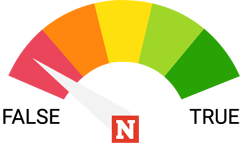Russia's stated reasons to invade Ukraine have expanded and shifted over the five months of the conflict, from misleading claims Ukraine needs to be "demilitarized" and "denazified," to suggestions it was a preventative strike, and, more recently, to admissions that it was effectively looking to topple Ukraine's pro-Western government and change the "World Order".
The imperialist rhetoric underlying much of that discourse, along with President Vladimir Putin and other Russian officials lamenting the dissolution of the Soviet Union in past statements, have led many to speculate that its ultimate goal is to resurrect the USSR (or some form of it).
Thus a statement from the Russian Defense Minister Sergei Shoigu, spread via a clipped video of his speech, in which he mentioned that the Soviet Union will be back, was quickly taken at face value as confirmation of the Kremlin's true ambitions.

The Claim
A short clip shared by Twitter user @Krichevskaya and others on Wednesday purported that Shoigu promised the return of the Soviet Union. The tweet, now deleted, was picked up by other prominent users, including former U.S. Ambassador to Russia Michael McFaul.
"The latest statements from Lavrov and Shoigu make very clear that Putin's war aims in Ukraine extend well beyond Donbas. Giving Putin another chunk of Ukraine will not produce lasting peace. Only stopping Putin on the battlefield will," McFaul tweeted later.
Other prominent accounts also shared the video, with some including Shoigu's direct quote:
Russian Defense Minister Sergei Shoigu speaking for the first time about Russia’s war goals:
— Visegrád 24 (@visegrad24) July 27, 2022
“Soon, there will be a Soviet Union again and we will again live in peace.”
At least the Russians have made that clear now. This isn’t just about the Donbas.
https://t.co/GO0EZcpTWh
Russian puppet master Sergei Shoigu states the goals of the war saying “Soon, there will be a Soviet Union again and we will again live in peace.”
— Anonymous Operations (@AnonOpsSE) July 27, 2022
Sure, we all know how this going to end.#FckPutin #FCKPTN #RussiaIsATerroristState pic.twitter.com/77IZrA6O1u
"Russian defense minister Shoigu: 'This is all temporary. There will be the Soviet Union again, no one will go anywhere, and we will live in peace'," Ostap Yarysh, a Voice of America journalist based in Ukraine, wrote.
Russian defense minister Shoigu: “This is all temporary. There will be the Soviet Union again, no one will go anywhere, and we will live in peace”.
— Ostap Yarysh (@OstapYarysh) July 27, 2022
Still have doubts about #Russia’s true intentions?https://t.co/0Nmig06xjV
"Still have doubts about #Russia's true intentions?" the caption in the tweet added.
The video and quote, either in full or paraphrased, was shared in posts seen by tens of thousands of Twitter and Telegram users over the following day.
The Facts
While the video of Sergei Shoigu's TV address is real, it has been taken out of context. He was in fact referencing events of the past.
The military chief was speaking at the 30th anniversary of the 1991-92 South Ossetia War, which was described by Russia back then (and still is to this day) as a "peacekeeping operation."
"The first peacekeeping operation of the Russian Federation, which began on July 14, 1992, in South Ossetia, was carried out in a single breath and became an important milestone for the country," Shoigu said.
"This is a one-of-a-kind situation in which a commission comprised of representatives from all law enforcement agencies was formed in a matter of days," he added, congratulating all those involved in the operation who were present at the meeting.
According to the minister, "it was a big, important, and vital task for our nation at the time."
Then Shoigu proceeded to make the statement that was later taken out of context. Still referring to the sentiment among the Russian leadership in 1992, he said:
"At the time, I am certain, especially among my generation, we were absolutely convinced that all of this was temporary, that our nation would once again be great and powerful, that the Soviet Union would return, and that no one would leave—everyone would live in peace and harmony," Shoigu said (Italics added by Newsweek for emphasis).
He added that he wished: "All those events truly remained history, and were never to repeat."
While this particular statement by the official has clearly been misinterpreted and misrepresented, others made in recent months have added fuel to the theory that Putin and his allies are intent on rebuilding the Soviet Union, or at least some version of it.
Russian officials and state-owned media have used neo-colonial rhetoric about the newly annexed Ukrainian territories, with terms like "reunification" and "coming home" dominating the coverage.
Russian Foreign Minister Sergey Lavrov said in a recent interview with Russian state media that Moscow's military mission goes beyond Ukraine's eastern Donbas region. "Now the geography is different," Lavrov told Russian state news outlet RIA Novosti.
And Putin himself has entertained the idea of a tri-state union that would include allied Belarus and the annexed parts of Eastern Ukraine.
Newsweek has contacted the Russian Ministry of Defense for comment.
The Ruling

False.
No, the Russian defense chief Shoigu did not promise the "return of the Soviet Union" in a recent speech. The clip was taken out of context, as he was in fact speaking about the 1992 war between Russia and Georgia over South Ossetia, and the sentiment about the country's future (and the belief in the return of the USSR) at the time, not today.
FACT CHECK BY NEWSWEEK
Uncommon Knowledge
Newsweek is committed to challenging conventional wisdom and finding connections in the search for common ground.
Newsweek is committed to challenging conventional wisdom and finding connections in the search for common ground.
About the writer
Yevgeny Kuklychev is Newsweek's London-based Senior Editor for Russia, Ukraine and Eastern Europe. He previously headed Newsweek's Misinformation Watch and ... Read more





